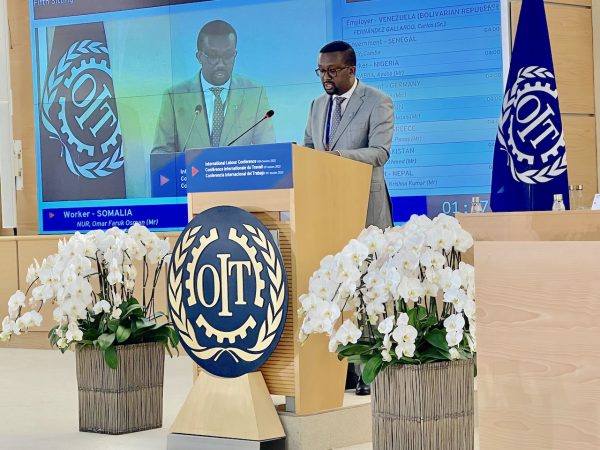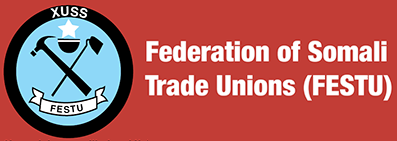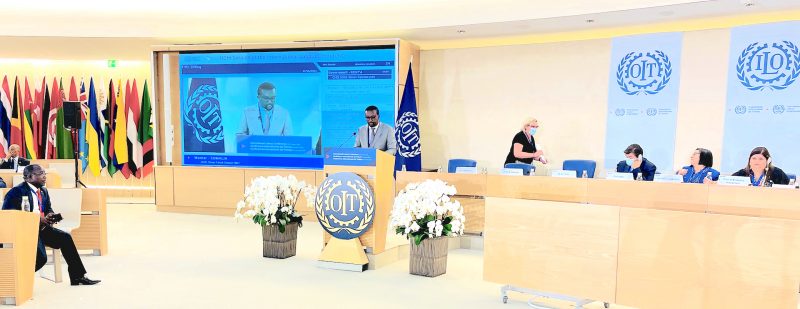7 June 2022
President,
Distinguished Delegates,
Ladies and Gentlemen:
Thank you for giving me the opportunity to address the 110th session of the International Labour Conference (ILC) on this auspicious occasion. As the voice of Somali workers and their trade union organisations, the Federation of Somali Trade Unions (FESTU) is honoured to be here.
Let me start by saying that the ILO Director-General’s report is very pertinent, extremely insightful and timely, rich with not only topical and contextual issues but also provides clear guidance as we aim to make the Doha Programme for Action a reality.
As a Least Developed Country (LDC), Somalia had indeed, as the report notes, experienced a period of sustained economic growth until the outbreak of the COVID-19 pandemic. Just before the pandemic, Somalia qualified for debt relief, finalised its National Development Plan 9 (NDP-9) and was well on its way to taking its rightful place on the international stage. Like most countries, the COVID-19 pandemic presented a significant risk to the fragile economic gains that had been made in previous years. This resulted in sharp reductions to household incomes and more alarmingly, in the context of a poverty rate of 73% and a youth unemployment rate of 67%. It remains clear that protecting the hard- won rights of workers during this period is critical for workers’ well-being underpinned by inclusive economic growth and sustainable development.
The past year has also brought with it unprecedented climate change induced calamities in Somalia, not least the deaths of large numbers of livestock, crop failures, loss of livelihoods – a situation that forced many households to fall deeper into the poverty hole. There are growing fears that close to 8 million Somalis are facing famine and require urgent humanitarian assistance.
The environment holds potential and can provide solutions to most of these challenges and it is in this regard that Somalia, one of the world’s most vulnerable countries to natural disasters including but not limited to climate change, has firmly anchored the environmental pillar in its country’s national development agenda.
Somali trade unions have taken up this mantle of the climate emergency and during the recent COP26, was vocal about Somalia’s climate change challenges and to date has remained committed to the shift towards job-rich green growth and Just Transition.
The Director-General’s report highlights that LDCs have serious deficits in virtually all indicators of social protection coverage and adequacy. For this reason, organizations like FESTU strive to make social protection a lived reality, largely by using Somalia’s social protection policy as a tool to monitor how well the government has delivered on commitments and the principles of the document. FESTU launched a sustained advocacy campaign for Somalia to adopt and expand more sustainable social protection programs by gradually moving away from crisis-focused, targeted and short-lived social protection response measures.

FESTU fully supports the efforts of the tripartite constituency at this conference regarding the inclusion of safe and healthy working conditions in the ILO’s framework of fundamental principles and rights at work. From our side, we have been using social dialogue to consult tripartite constituents in Somalia, helping to tackle the grave safety and health crisis facing workers who are exposed to abuses and injuries while at work. We believe that in addition to ensuring that ILS are respected; social dialogue is vital to orient and direct programmes, improve the workplace environment towards more conducive working conditions that support decent jobs and better livelihoods.
Finally, we want to join the call for the cessation of hostilities in Ukraine. We call on the international community to engineer a robust and inclusive negotiation process to resolve the war. In Somalia, activities of extremist groups are making life, living and livelihoods hard and frustrating for Somalis. Aside from the humanitarian crisis that violent insecurity breeds, the multiplier effects on households and the economy are staggering. Somalia will need support to contain the menace of civil war, insecurity and political instability aimed at advancing a better people-centred development agenda.
I thank you!

